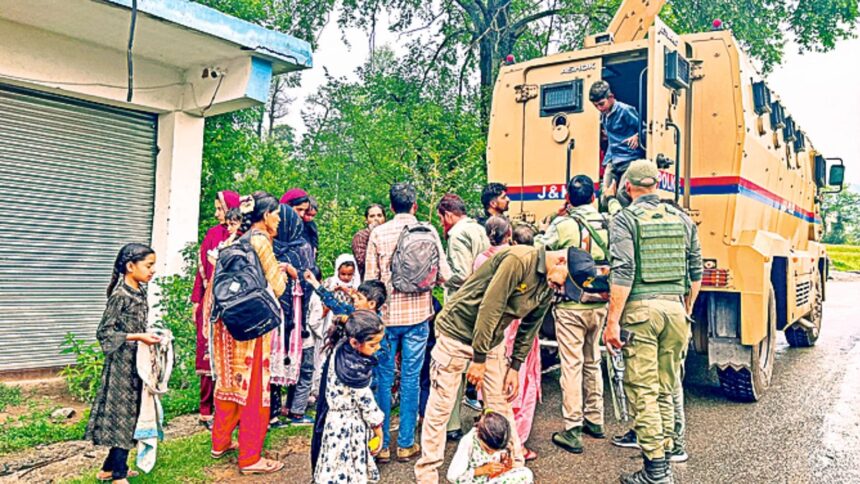The , the border town of Poonch is deserted, its residents having moved to safer locations.
In the early hours of Wednesday, soon after , Pakistani forces began an intense bout of shelling across the Line of Control. Officials say 16 civilians, including five children, have died in the barrage of artillery fire the likes of which they haven’t witnessed since the 1971 war.
The shelling also hit a place of worship, an educational institution, a forest department office and a bus stand.
“There was not the case even during the . We always believed Pakistan deliberately avoided targeting the city of Poonch. This time, Pakistani forces made no distinction between gurdwaras, temples and mosques. Qari Mohammad Iqbal was killed just near my home,” said Surjan Singh, referring to the death of a madrasa teacher.
Iqbal was standing in front of the Jamia Zia Ul Uloom Madrasa when a shell struck and killed him.
Surjan had a close shave when his house was hit by a shell, but his cousin Amarjeet Singh died in the incident. Amarjeet, an ex-Armyman, was sleeping near Surjan when the shell struck. He was struck by shrapnel and fatally wounded.
Surjan wonders if life will ever be the same.
One of the shells struck a family home in the Dungus area, killing 14-year-old Zoya Khan and her brother, 12-year-old Zain Khan. Their father, Rameez Khan, was injured. Two siblings of the same age from another family, Ayan Khan (14) and Aruba Khan (12), were also killed in the shelling.
“My friend Rizwan lost his children, Ayan and Aruba, when a shell struck his car. He is hospitalised,” said resident Harcharan Singh (50), who stayed back in Poonch even as thousands have been evacuated.
He said that although people knew that they were in the direct line of fire of Pakistan Army posts located on higher grounds, there was always the belief that the civilians would not be targeted. “That belief was shattered on Wednesday,” Harcharan said.
When the shelling stopped on Wednesday afternoon, the exodus began. Many of those who left went to Surankote, Mandi or far-off city. In the absence of public transport, people were seen carrying luggage on their heads and walking towards Surankot.
Local resident Ajaz Kazmi said there wasn’t enough money in ATMs, causing more problems for those leaving.
Khalil Ahmed Bandey, a 70-year-old retired forest official, left his home in Ward No. 10 and went to Surankote with his family, including his daughter and her two minor children.
Bandey was in class 10 during the 1971 Indo-Pak war, during which he and other local youths went to Khanpir to assist Indian troops in driving Pakistani infiltrators out of the area. For his contribution, he was given a commendation by the Army.
His close relative, Saima Qazi, said that during Wednesday’s shelling, the family stayed huddled in a room, praying. A shell had fallen on a house right next to theirs. His daughter and grandchildren had come to visit him from just two days earlier.
While people have temporarily evacuated Poonch in the past too, many are now considering permanently moving elsewhere. “This time, civilians came under direct shelling. We no longer have the confidence that we can live safely after returning,” said M D Anwar, a resident.








